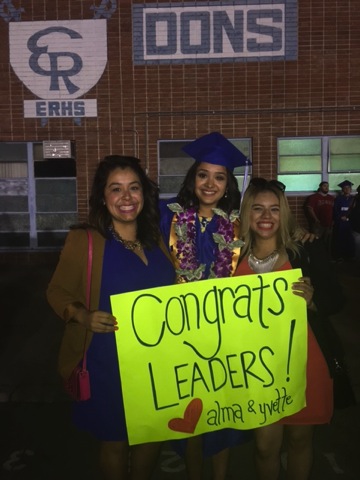“AP classes are preparing me for college because they assign so many readings I know I will not pass if I don’t do the readings ahead of time…But I know not everyone gets that.” Vanessa, a leader in my college readiness program, was one of the first students to ever share with me how she felt about some of the access disparities at her school. Vanessa comes from a supportive family with engaged parents, who despite not going to college themselves, have embedded in her the belief that education is, in fact, the key to success. Vanessa, however, was very aware that not everyone at her school felt the same way. When asked about her feelings towards college, she recognized that senior year was challenging because there were so many parts to applying to college but she was not afraid of what came after. She chose to become a peer advisor for the Career Center with the hope of providing some of her peers, who are not in advanced courses, with the guidance necessary to get through senior year and have a successful transition into college.
Vanessa is only one of 623 Seniors at El Rancho High School in Pico Rivera. While she understood the importance of college and felt prepared to transition into postsecondary education, she was also aware that not all her classmates felt as prepared. According to the Cohort Study of Urban High School Reform efforts, researchers found that while new federal legislation introduced a policy move to increase the number of underrepresented high school graduates going to college, there is still a predicted shortage of roughly 23 million college-educated people in the US workforce by the year 2025, all due to a disparity in college access. This disparity is noticeable across schools in the country, often focused on the inequities between schools located in affluent communities and those in urban, disadvantaged areas. The disparities, however, often exist within school systems themselves, as strategies used to support a student’s successful transition to college is often a cookie-cutting method that does not reach all students.
While college is a widely accepted necessity for our youth, too many academically able students are still not enrolling in postsecondary education. The persistent achievement gaps are evident through the school system, specially affecting areas with concentrated minority demographics who lack access to resources (test prep tutoring, personalized college counseling, internships, etc). The gap remained large for college enrollment in urban high schools due to the lack of comprehensive college access initiatives, that cater to student needs and not only the “crème of the crop.” Students, like Vanessa, are fortunate to rely on the experience of advance courses (AP classes) as preparation for the future; in essence, it was her enrollment in AP courses that further motivated her to aspire, work and prepare towards a post secondary education. However, as Vanessa noted herself, not all students are given the same attention and guidance and that in itself is an issue. On the last day of school, Vanessa asked me a question I still have not found the answer too. Perhaps, you all can help me formulate a response: “After years of having the same structure of counseling, where only the ones who seek support get the help, does having so many students not go to a 4 year university raise a red flag. Isn’t it time to change up the way they (administration) do things? Why haven’t they created a system that makes sure ALL students have one-on-one counseling?”
(Vanessa is now an intern for Be A Leader and hopes to one day become a college counselor.)
Alma Renteria
Latest posts by Alma Renteria (see all)
- Rincón Universitario: Cómo Escribir una Narrativa Auténtica para Solicitudes de Universidades, Parte 3 - October 17, 2019
- College Corner: How To Write An Authentic Narrative for College Applications, Part 3 - October 15, 2019
- Rincón Universitario: Cómo Escribir Una Narrativa Auténtica para Solicitudes Universitarias, Parte 2 - October 1, 2019
- College Corner: How To Write An Authentic Narrative for College Applications, Part 2 - September 26, 2019
- College Corner: Cómo Escribir un Relato Auténtico de Solicitudes para la Universidad, Parte 1 - September 4, 2019

